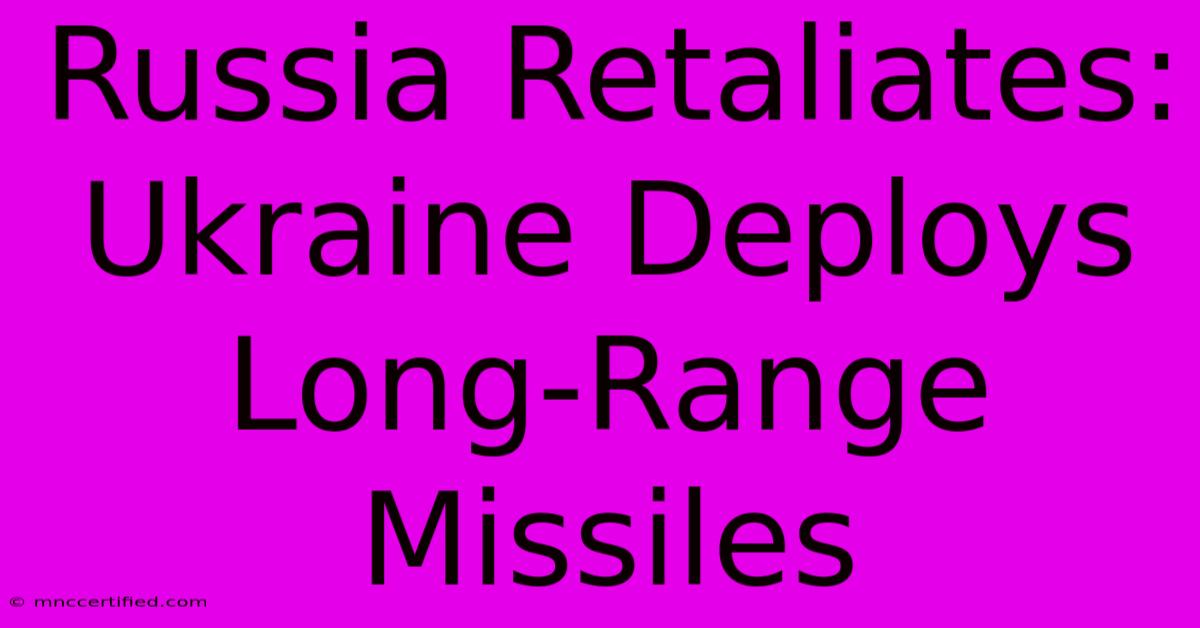Russia Retaliates: Ukraine Deploys Long-Range Missiles

Table of Contents
Russia Retaliates: Ukraine Deploys Long-Range Missiles – A New Phase in the Conflict?
The ongoing conflict in Ukraine has taken a significant turn with Ukraine's recent deployment of long-range missiles, prompting swift and forceful retaliation from Russia. This escalation marks a potentially pivotal moment in the war, raising concerns about further escalation and the implications for regional and global stability. This article delves into the details of this development, exploring the strategic implications, the potential consequences, and the broader geopolitical context.
Ukraine's Long-Range Missile Deployment: A Game Changer?
Ukraine's use of long-range missiles represents a notable shift in the battlefield dynamics. While specifics regarding the exact type and number of missiles deployed remain somewhat obscured for strategic reasons, reports suggest a capability to strike targets deep within Russian-held territory. This newfound range allows Ukraine to target critical infrastructure, military installations, and potentially even command centers previously beyond its reach. This capability is widely seen as a significant boost to Ukraine's counteroffensive efforts.
This development also highlights the growing sophistication of Ukraine's military capabilities, thanks in part to the substantial military aid received from Western allies. The successful deployment of these missiles demonstrates Ukraine's ability to adapt and innovate in the face of ongoing conflict, challenging Russia's dominance in certain aspects of the war.
Analyzing the Strategic Implications
The strategic implications of Ukraine's actions are multifaceted:
- Increased Offensive Capabilities: The ability to strike deep within Russian territory significantly enhances Ukraine's offensive potential, allowing for more targeted strikes against high-value assets.
- Shifting Battlefield Dynamics: This development alters the balance of power, potentially forcing Russia to re-evaluate its strategic deployments and defensive strategies.
- Potential for Escalation: The deployment of long-range missiles increases the risk of further escalation, raising concerns about a wider conflict.
- Western Support and Geopolitical Implications: The effectiveness of these missiles is directly related to the continued supply of Western military aid. This highlights the crucial role of international support in shaping the course of the conflict and underscores the geopolitical tensions involved.
Russia's Retaliation: The Response and its Ramifications
Russia has responded swiftly and decisively to Ukraine's actions, unleashing a barrage of retaliatory strikes targeting Ukrainian infrastructure and military positions. These strikes, while aimed at disrupting Ukraine's offensive capabilities, have also resulted in civilian casualties and widespread damage.
The nature of Russia's response underscores the seriousness with which it views Ukraine's deployment of long-range missiles. It signals a potential hardening of Russia's stance and a willingness to escalate the conflict further if necessary. The retaliatory strikes also raise serious humanitarian concerns, given the potential for widespread civilian suffering.
Assessing the Risks of Further Escalation
The current situation carries significant risks of further escalation. The use of long-range missiles by both sides creates a dangerous cycle of retaliation and counter-retaliation, which could easily spiral out of control. The potential for miscalculation or accidental escalation is a major concern.
The international community must act decisively to prevent further escalation. Diplomatic efforts aimed at de-escalation and achieving a peaceful resolution are crucial. Ignoring the situation or failing to actively engage in de-escalation efforts could have severe consequences with far-reaching global impacts.
The Path Forward: Diplomacy and De-escalation
The current situation underscores the urgent need for diplomatic engagement and de-escalation efforts. All parties involved must prioritize dialogue and work towards a peaceful resolution to the conflict. International pressure and mediation efforts are essential in preventing further bloodshed and promoting stability in the region.
The long-term stability of the region will depend on a commitment to peaceful conflict resolution, including addressing the root causes of the conflict and fostering a lasting peace. This requires not only immediate action to de-escalate the current crisis but also a sustained commitment to building trust and fostering cooperation among all stakeholders. The deployment of long-range missiles has significantly altered the landscape of this conflict, making the pursuit of peace even more urgent and vital.

Thank you for visiting our website wich cover about Russia Retaliates: Ukraine Deploys Long-Range Missiles. We hope the information provided has been useful to you. Feel free to contact us if you have any questions or need further assistance. See you next time and dont miss to bookmark.
Featured Posts
-
Business Vehicle Insurance Tryon
Nov 22, 2024
-
Ukraine Hit By Russian Ballistic Missile
Nov 22, 2024
-
Lewis Commits Sanders Reaction
Nov 22, 2024
-
Browns Upset Steelers Winston Leads Way
Nov 22, 2024
-
Coless Surprise Health Reveal
Nov 22, 2024